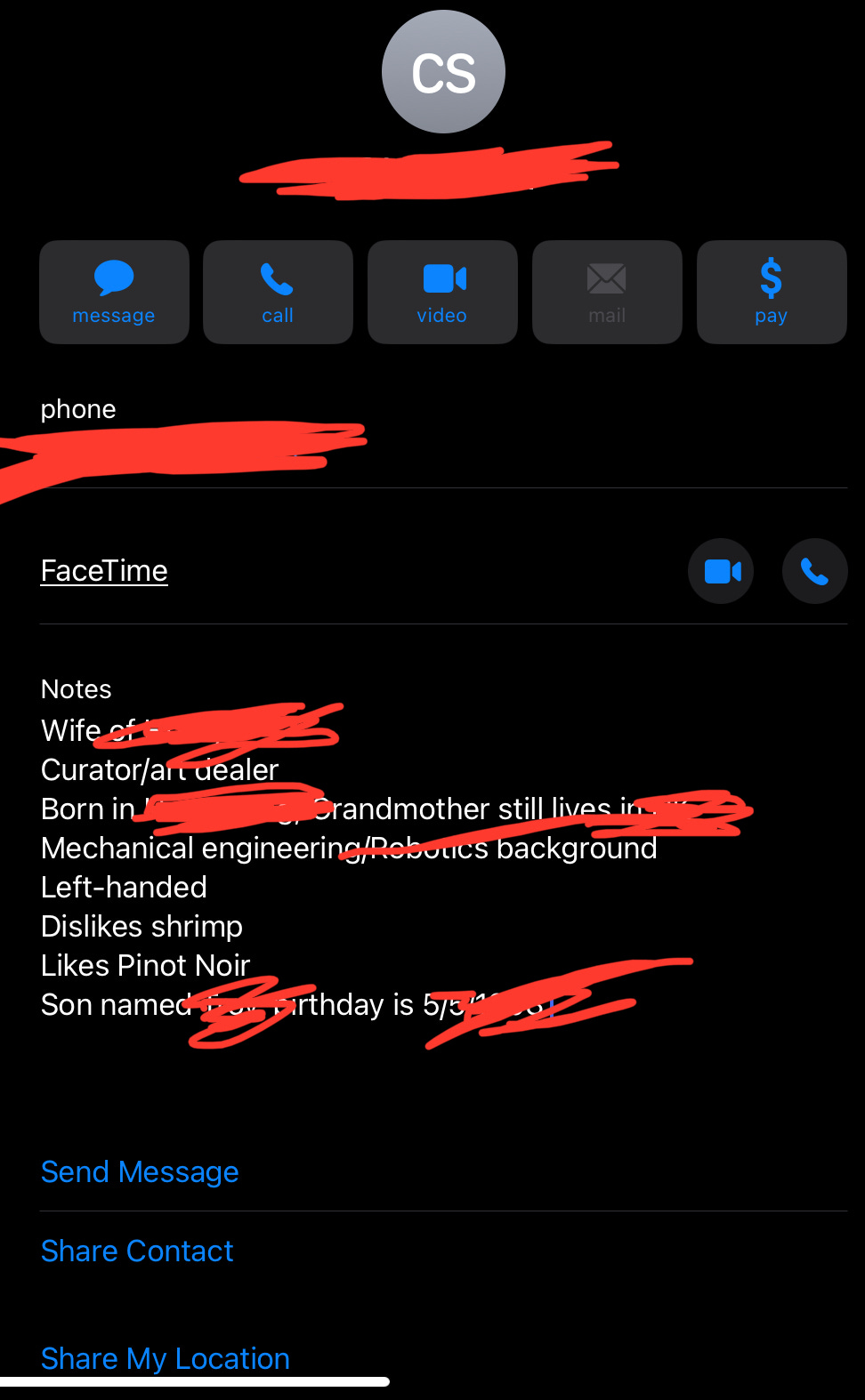Theory of Mind - Harvesting the Low-Hanging Fruit of Social Intel by Using the “Notes” Section of Your Phone
Successfully navigating the landscape of social interactions means refining your imperfect internal “map” of everyone in your life
In the lexicon of cognitive science and philosophy, the term “Theory of Mind” refers to the ability to attribute mental states—beliefs, intentions, desires, and so forth—to oneself and others. Essentially, it involves constructing a mental model of how someone else thinks and feels. Understanding this concept is pivotal for anyone aiming to navigate the intricate networks of social and professional relationships effectively.
The Fuzzy Mirror: Perceptions and Reality
Imagine for a moment that each person you know holds a unique but incomplete portrait of you in their mind. For casual acquaintances or transactional relationships, the depiction is likely fuzzy and lacking in detail, captured in broad strokes which communicate only the most salient traits. How would your landlord, car mechanic or housekeeper describe you, and which of your attributes would they focus on (and what aspects of you would they be oblivious to, or utterly wrong about if they had to guess?)
The more intimate the relationship, the more nuanced and accurate the portrait becomes. But even these 'high-definition' renditions are not without their distortions—they are often shaped by intense emotional experiences or extreme situations that might not represent your average disposition. A former lover who is still embittered about your separation may know a lot more about you than nearly everyone else, but because of the intensely negative emotions she feels about your breakup, she will slant those details in the most-unflattering way possible, and describe you far worse a human being than you actually are.
This phenomenon is not one-sided; you, too, hold such fuzzy (and less-fuzzy) mental portraits of people in your life, and with it, biases unique to your own emotional overlay on the technical details you remember about each person. Herein lies a conundrum: creating a finely detailed mental map of someone's likes, dislikes, strengths, and weaknesses is an investment, requiring both time and cognitive resources. It comes at an opportunity cost, for you cannot possibly map everyone in your circle to the same degree of granularity. Yet, the more accurate your map, the better positioned you are to offer value, whether emotional or material, to that individual.
Detractors may argue that such an intensive focus on understanding others' mental states verges on manipulative. One could claim that true relationships should not be founded on calculated investments in understanding another's psyche but should evolve organically, free from strategic intent. Indeed, some may find the whole premise disquieting, likening it to a form of social engineering.
Ironically, the very fact that I was able to articulate the above-mentioned perspective (which stands adversarial to my own) requires that I exercise the very Theory of Mind mental-mapping which detractors object to.
The reflexive discomfort many experience in the presence of powerful psychological tools has less to do with the existence of powerful tools themselves, and more to do with their fear of these tools’ misuse.
The reflexive wariness of those unfamiliar with psychological tactics mirrors the way that someone inexperienced around the kitchen feel nervous about the presence of so many grim-looking implements (where it’s easier to imagine their misuse than their innocuous, culinary function).
And while we are on this analogy, it is worth acknowledging that many kitchen implements can indeed be misused to inflict grievous harm on others, just like many powerful psychological tactics can indeed be used to manipulate and harm others.
The same sharp kitchen blade which can effortlessly kill a man with a single stroke is also capable of preparing a delicious Michelin Star meal. Scorning the existence of a well-sharpened blade just because it can be misused for murder is shortsighted.
Indeed, it is our position that such mental mapping is not only pragmatic but even considerate, if applied with benevolent, win-win intentions. The more accurately you understand someone, the better you can meet their needs or enrich their life in ways that are meaningful to them. Consider the times we feel frustrated or disappointed when others don’t take the time to remember how to spell our names, remember our preferences or important memories.
The act of taking the time to understand another person deeply is itself be seen as a form of generosity and commitment.
Harvesting Low-Hanging Fruits: Practical Steps for Novices in the Favor Bank
As novices on the path to becoming adept practitioners of the Favor Bank methodology, the concept of constructing intricate mental maps for VIPs in your life may appear daunting. While it's true that high-level practitioners expend immense cognitive resources discerning the nuanced behaviors and preferences of key individuals, it's important to recognize that everyone starts somewhere. For beginners, focusing on easily attainable, low-hanging fruits can set the foundation for more advanced strategies later on.
The Power of the Digital Notepad: Beyond Phone Numbers and Emails
In our modern age, the ubiquity of smartphones offers a convenient and often underutilized tool: the digital notepad. While you may already use this feature for tasks or shopping lists, it can serve as a potent weapon in your Favor Bank arsenal. Here, you can record not just phone numbers or email addresses but also pertinent details about the people in your circle—details that can help you construct a preliminary but impactful mental map of them.
When a colleague mentions their upcoming anniversary, jot it down. When a friend tells you about their child's upcoming birthday or talks about their favorite vacation spot, add that to the “notes” section under their entry on your smartphone. These details may seem trivial in isolation, but collectively, they form the foundation of a rudimentary but effective Theory of Mind.
Social Dividends of Attention to Detail
There's a pervasive, albeit often unspoken, sense of disappointment people experience when they have to repeatedly supply information to a person they've already shared. Think back to an occasion when you’ve had to repeatedly inform someone the correct spelling of the name of your spouse or child, or a significant birthday/anniversary. Even if there was no malice on the part of the person doing the asking, the repetitive questioning subtly communicate a lack of genuine interest or respect which subtly degrades the quality of our relationship with the person asking.
By maintaining a detailed digital notepad, you preempt this issue, emerging as someone who takes relationships seriously enough to remember vital information. People may not even consciously know why they like you so much - yet one of the reasons is that unlike most people, you’ve never asked them twice for important personal details that are emotionally-important to them.
The Illusion of Retention and the Imperative of Note-Taking
Many of you reading this may find yourself scoffing in your heads. “Who needs notes? -That all seems ridiculous and overkill - I remember what people say to me!”
The human propensity to overestimate the capacity of our memory is a well-documented cognitive bias. We are often confident in the moment, assured that we can recall the minutiae of our interactions. But as time progresses, the details fade, leaving behind a silhouette of the original conversation, often marred with distortions.
I know it’s uncomfortable to be reminded of this human frailty, but for those of you who disbelieve me and consider yourself blessed with superior recall of conversations and detail, please play along for this thought exercise:
Without looking at your phone or calendar, write down the names of the last five people you’ve had in-person conversations with, in reverse order. Now, next to their names, write down the color of shirt or top they were wearing.
How did you do in remembering even the most-obvious details from your previous five in-person conversation?
The stark realization that arises from this challenge serves as a powerful argument for the necessity of notetaking. It punctures the bubble of self-assuredness regarding memory and highlights the need for external tools to augment for our all-too-human cognitive shortcomings.
The Unnecessary Risk of Relying on Memory
In an age abundant with technology that can assist in information retention, relying solely on one's memory for critical interpersonal details is not only outdated but also needlessly risky. It's a self-imposed handicap in the cultivation of your own reputation as a value-emitter within your social and professional circles.
The Integration of Notetaking into Social Capital
As the Favor Bank relies on the currency of social goodwill and mutual benefit, ensuring the integrity of every transaction—of every shared moment and exchanged detail—becomes paramount. Notetaking, therefore, is not a mere administrative task; it is a foundational practice for anyone serious about building and maintaining a network where value is remembered and reciprocated.
In sum, the the message that notetaking is less about the avoidance of social faux pas and more about the affirmation of social bonds. Note-taking is an act of respect, a method of honoring the exchange of words, and a strategy for deepening the roots of every relationship fostered. Through this lens, readers are invited to reevaluate the role of memory in their social interactions and to embrace the discipline of notetaking as a critical tool for nurturing their Favor Bank.
Augmenting Memory, Building Trust
While constructing elaborate, highly accurate mental maps of your VIPs is an aspirational goal, it's crucial not to overlook the foundational steps that pave the way for such advanced social navigation. Utilizing digital tools to augment your memory offers a practical, accessible method for newcomers to the Favor Bank methodology. This practice not only aids in the construction of a rudimentary Theory of Mind but also sends a potent message to your social circle—you are someone who pays attention, who remembers, and by extension, who can be trusted. It's a simple but effective way to begin establishing yourself as a valuable node in the network of mutual obligations and favors.
As you navigate your own web of social and professional relationships, the concept of Theory of Mind provides a critical framework for understanding the give-and-take of social capital. Whether you are keen on building a robust Favor Bank or simply wish to improve your interpersonal relationships, being mindful of this mental mapping can offer a competitive edge or, at the very least, a more profound level of empathy and understanding.
Like any powerful tool, it can be used for both beneficial or destructive/manipulative ends—the choice of which ultimately lies in your hands.





